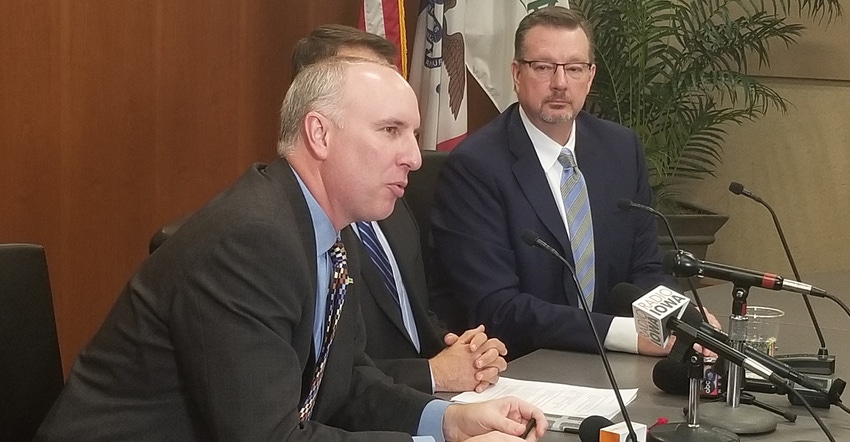October 30, 2019

Frustrated with the U.S. Environmental Protection Agency’s proposed new rule for blending ethanol and biodiesel into the nation’s gasoline and diesel fuel supply, leaders of farm groups and the biofuel industry are urging farmers and others to “let EPA and the Trump administration know how you feel.”
In early October, EPA Administrator Andrew Wheeler and President Donald Trump promised to boost the sagging market for ethanol and biodiesel. They said EPA would add additional gallons to the Renewable Fuel Standard’s annual volume requirements. The amount added would offset the millions of gallons of ethanol and biodiesel demand lost to RFS waivers the administration has been granting to oil refineries. The number of gallons to be restored annually was to be calculated using a three-year average of the waivers granted. But when EPA rolled out the proposed rule on Oct. 15, it was not what had been promised.
Instead, the three-year average figure would come from a recommendation by the Department of Energy, not from the actual number of gallons waived by EPA. The difference is that the administration would be able to change those DOE numbers. You wouldn’t be able to look at the RFS exemptions and come up with a known figure for the amount of ethanol and biodiesel to be added back each year.
Following an Oct. 30 public hearing in Michigan, EPA is holding a 30-day comment period on the proposed plan. The agency has said it will finalize action later this year.
EPA plan a step backward
“The RFS requires oil refiners to blend a certain number of gallons of ethanol and biodiesel into the nation’s fuel supply each year,” says Monte Shaw, executive director of the Iowa Renewable Fuels Association. “The RFS requirement for corn ethanol is a minimum of 15 billion gallons annually. Any proposal that doesn’t account for the actual number of waived gallons as called for by the RFS fails to restore the integrity of the law.”
EPA approved waivers for 1.4 billion gallons of renewable fuel in the latest round of 31 exemptions it granted in August. The DOE, which provides an initial review of small refinery waiver requests, had recommended granting waivers for 770 million gallons. EPA makes the final decisions.
Farm and biofuel group leaders are disappointed in EPA’s current plan. “We had a deal with the president, but what the EPA rolled out isn’t that deal,” Shaw said at an Oct. 16 press conference, held jointly by IRFA along with the Iowa Corn Growers Association and Iowa Biodiesel Board.
EPA’s public comment period on the proposed new rule begins Oct. 31 and is open until Nov. 29. “We have a number of things people can do to voice their comments,” says Craig Floss, CEO of ICGA. “We urge people to follow along on the ICGA website, as we will be doing ‘calls to action.’ Log onto iowacorn.org for instructions on how to file your comments and give EPA and the administration your personal reasons why this issue is important to your farming operation.”
Send comments to EPA
Floss adds, “Everyone needs to understand what’s going on here. A deal ought to be a deal, and at best what Mr. Wheeler has done is misleading, and at worst he’s been flat-out lying to us. EPA’s proposed rule can be changed. But it’s going to take everyone calling in to get EPA to make the change, and not just corn farmers. Everyone who cares about Iowa’s economy should send a comment to EPA on this rule.”
Nearly 30 U.S. ethanol and biodiesel plants have closed either temporarily or permanently because of the waivers, including four in Iowa. Dozens more have reduced production. “The proposed EPA rule would not provide a boost to the ethanol or biodiesel market to help these plants,” Shaw says. “This EPA proposal will not restart any of these plants. Without the certainty of ethanol and biodiesel demand that the original plan would provide, more biofuel plants, jobs and farmer investments are on the line.”
The Iowa Soybean Association website also has links to help send comments to EPA and other government officials, via email and social media.
“If left unchallenged, EPA’s new rule will further gut the RFS, kill even more demand for soybeans and biodiesel, and shutter additional facilities,” says Grant Kimberley, director of market development for ISA and executive director of the biodiesel board. “A full accounting of the lost gallons due to the refinery exemptions was the agreement. That was our agreement with the president. Promise made, promise not kept. EPA needs to stand with the deal that was cut by President Trump. We need to have this issue resolved.”
About the Author(s)
You May Also Like






